最新人教版英语八年级上册全册重点句型汇总
人教版八年级上册英语语法、短语和知识点总结归纳

人教版八年级上册英语语法、短语和知识点总结归纳一、语法1. 一般现在时- 用法:表示经常性或惯性的动作或状态。
- 结构:主语 + 动词原形 (+ 其他成分)- 示例:I play soccer every weekend.2. 一般过去时- 用法:表示过去某个时间点或一段时间内发生的动作或存在的状态。
- 结构:主语 + 动词过去式 (+ 其他成分)- 示例:She watched a movie last night.3. 现在进行时- 用法:表示现在正在发生的动作。
- 结构:主语 + am/is/are + 动词-ing (+ 其他成分)- 示例:They are studying for the exam.4. 现在完成时- 用法:表示动作或状态发生在过去某个时间点,但与现在有关。
- 结构:主语 + have/has + 动词过去分词 (+ 其他成分)- 示例:I have finished my homework.5. 情态动词- 用法:表示能力、意愿、可能性等。
- 常见的情态动词有 can, could, may, might, must, should, ought to 等。
- 示例:He should go to bed early.二、短语1. as well as- 用法:表示两个事物同时存在或发生。
- 示例:She can speak English as well as Chinese.2. in order to- 用法:为了做某事。
- 示例:They woke up early in order to catch the train.3. by the way- 用法:用于引入一个新的话题或问题。
- 示例:By the way, have you seen the latest movie?三、知识点1. 直接引语和间接引语- 直接引语:用引号括起来的原话。
- 间接引语:将直接引语转述为陈述句或疑问句。
人教版八年级英语上册 Units 1-6 重点句
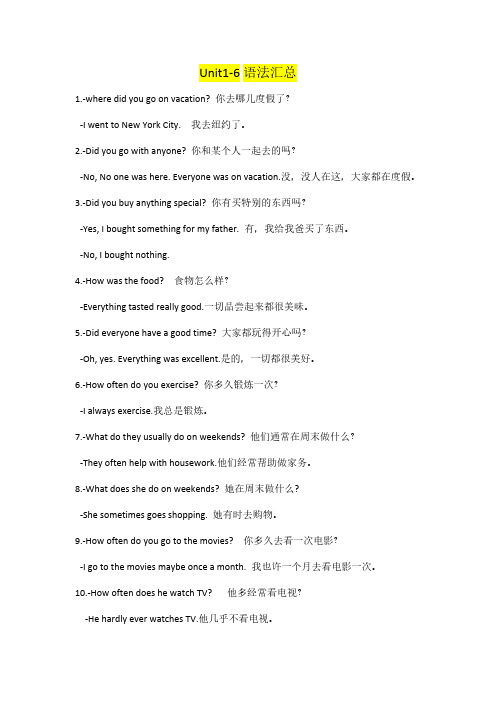
Unit1-6语法汇总1.-where did you go on vacation? 你去哪儿度假了?-I went to New York City. 我去纽约了。
2.-Did you go with anyone? 你和某个人一起去的吗?-No, No one was here. Everyone was on vacation.没,没人在这,大家都在度假。
3.-Did you buy anything special? 你有买特别的东西吗?-Yes, I bought something for my father. 有,我给我爸买了东西。
-No, I bought nothing.4.-How was the food? 食物怎么样?-Everything tasted really good.一切品尝起来都很美味。
5.-Did everyone have a good time? 大家都玩得开心吗?-Oh, yes. Everything was excellent.是的,一切都很美好。
6.-How often do you exercise? 你多久锻炼一次?-I always exercise.我总是锻炼。
7.-What do they usually do on weekends? 他们通常在周末做什么?-They often help with housework.他们经常帮助做家务。
8.-What does she do on weekends? 她在周末做什么?-She sometimes goes shopping. 她有时去购物。
9.-How often do you go to the movies? 你多久去看一次电影?-I go to the movies maybe once a month. 我也许一个月去看电影一次。
10.-How often does he watch TV? 他多经常看电视?-He hardly ever watches TV.他几乎不看电视。
八年级英语(人教版)上册重点语法知识点

八年级上册重点语法知识点1. 感叹句:感叹句是用来表达喜怒哀乐等强烈情感的句子。
感叹句一般用how或者what开头,句末加感叹号。
what修饰名词,how修饰形容词或副词。
具体句式如下:(1)what引导的感叹句:1)What a(an)+形容词+可数名词的单数形式+主语+谓语!What a clever boy he is!多么聪明的小男孩啊!2)What+形容词+可数名词的复数形式+主语+谓语!What interesting books the children are reading! 孩子们读的书多么有趣啊!3)What+形容词+不可数名词+主语+谓语!What cold weather it is!多冷的天!(2)how引导的感叹句:1)How+形容词或副词+主语+谓语!How lovely the baby is!这孩子真可爱!(lovely为形容词)How fast he runs! 他跑地多快啊!(fast为副词)2)How+形容词+a(an)+可数名词的单数形式+主语+谓语!How heavy a box they are carrying! 他们抬的箱子多重啊!3)How+主语+谓语!How time flies! 时间过得多快!( ) 1. interesting job this is!A.WhatB.HowC.What anD.How an( ) 2. Mo Yan won the Nobel Prize for Literature last year. _______excellent he is!A. HowB. WhatC. What aD. What an( ) 3. ---______day it is!--- Let’s go out and enjoy the sunshine!A. What a lovelyB. How windyC. What a rainyD. How lovely( ) 4. ______ terrible weather we had last Sunday!A. WhatB. What aC.HowD. How a( ) 5. ______useful the book is! We can know well about the city from it.A. WhatB. What aC. HowD. What an( ) 6. _____great picture! Who painted it?A. HowB. WhatC. How aD. What a( ) 7. ______ a beautiful car! I’ve never seen it before.A. WhatB. WhichC.HowD.Whether2. How oftenhow often意为“多久一次”,常用于对时间频率的提问。
人教版八年级上册英语各单元重点短语句型
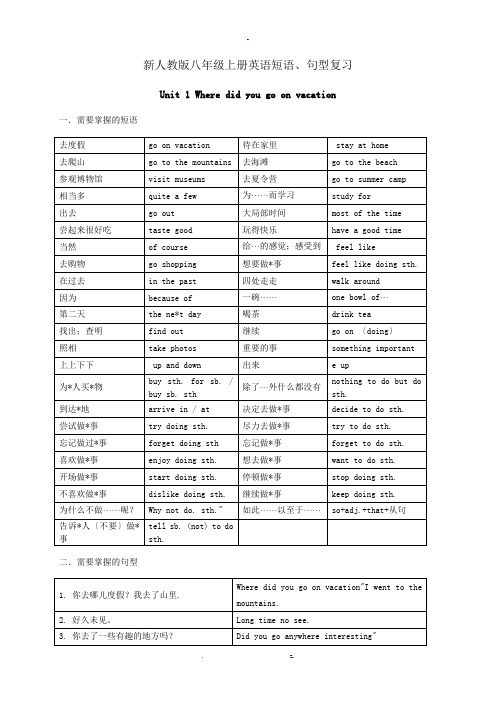
新人教版八年级上册英语短语、句型复习
Unit 1 Where did you go on vacation 一.需要掌握的短语
二.需要掌握的句型
Unit 2 How often do you e*ercise" 一.需要掌握的短语
.
二.需要掌握的句型
Unit 3 I’m more outgoing than my sister. 一.需要掌握的短语
Unit 4 What’s the best movie theater"
一.需要掌握的短语
二.需要掌握的句型
Unit 5 Do you want to watch a game show" 一.需要掌握的短语
Unit 6 I’m going to study puter science.
一.需要掌握的短语
Unit 7 Will people have robots" 一.需要掌握的短语
二.需要掌握的句型
Unit 8 Will people have robots"
一.需要掌握的短语
二.需要掌握的句型
Unit 9 Can you e to my party" 一.需要掌握的短语
二.需要掌握的句型。
人教版八年级英语上册语法总结

人教版八年级英语上册语法总结一、一般现在时。
1. 概念。
- 表示经常或习惯性的动作或状态;表示客观事实或普遍真理。
- 例如:I often get up at six o'clock.(经常的动作)- The earth goes around the sun.(客观真理)2. 动词形式。
- 当主语是第三人称单数(he/she/it等)时,动词要加 -s或 -es。
- 一般情况加 -s,如:like - likes;以s, x, ch, sh, o结尾的动词加 -es,如:go - goes, watch - watches;以辅音字母 + y结尾的动词,把y变为i再加 -es,如:study - studies。
- 当主语不是第三人称单数时,动词用原形。
例如:They play football every day.3. 句型结构。
- 肯定句:主语+动词(原形/第三人称单数形式)+其他。
- 否定句:主语+don't/doesn't+动词原形+其他。
(do not = don't,does not = doesn't)- 一般疑问句:Do/Does+主语+动词原形+其他?回答:Yes, 主语+do/does. No, 主语+don't/doesn't.二、一般过去时。
1. 概念。
- 表示过去某个时间发生的动作或存在的状态。
- 例如:I went to the park yesterday.2. 动词形式。
- 一般动词在词尾加 -ed,如:play - played;以不发音的e结尾的动词加 -d,如:live - lived;以重读闭音节结尾且末尾只有一个辅音字母的动词,双写这个辅音字母再加 -ed,如:stop - stopped;以“辅音字母 + y”结尾的动词,把y变为i再加 -ed,如:study - studied。
还有一些不规则动词,如:go - went, see - saw等。
人教版八年级上册英语重点句型归纳

人教版八年级上册英语重点句型归纳一、祈使句1. 肯定祈使句:动词直接用原形,如:Look at the blackboard.2. 否定祈使句:在动词前加Don’t, 如:Don’t talk in class.二、一般现在时1. 肯定句:主语+动词原形,如:She sings well.2. 否定句:主语+动词原形+not,如:They do not like playing football.三、一般过去时1. 肯定句:主语+动词过去式,如:She watched TV last night.2. 否定句:主语+助动词did+not+动词原形,如:I did not finish my homework yesterday.四、现在进行时1. 肯定句:主语+am/is/are+动词-ing,如:She is reading a book now.2. 否定句:主语+am/is/are+not+动词-ing,如:They are not playing games.五、一般将来时1. 肯定句:主语+will+动词原形,如:I will see you tomorrow.2. 否定句:主语+will+not+动词原形,如:He will not be late for school.六、情态动词1. can/can’t:表示能力/可能性,如:She can swim. She can’t speak Chinese.2. must/mustn’t:表示必要性/禁止性,如:You must finish your homework. You mustn’t play football in the classroom.七、There be 句型1. 肯定句:There is/are+名词,如:There is a book on the desk.2. 否定句:There is/are+not+名词,如:There are not any apples in the basket.八、疑问句1. 一般疑问句:助动词/情态动词+主语+动词原形,如:Can she swim?2. 特殊疑问句:疑问词+一般疑问句,如:Where is your father?以上是人教版八年级上册英语重点句型的归纳总结。
八年级英语上册重点短语句型(人教版)
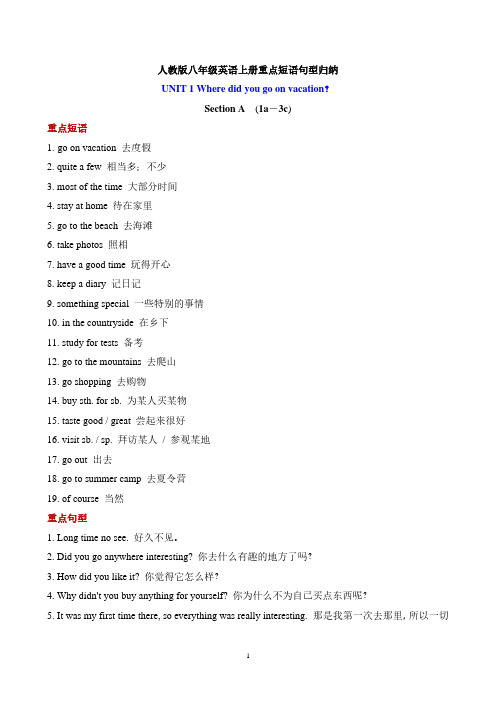
人教版八年级英语上册重点短语句型归纳UNIT 1 Where did you go on vacation?Section A(1a-3c)重点短语1.go on vacation去度假2. quite a few相当多;不少3. most of the time大部分时间4. stay at home待在家里5. go to the beach去海滩6. take photos照相7. have a good time玩得开心8. keep a diary记日记9. something special一些特别的事情10. in the countryside在乡下11. study for tests备考12. go to the mountains去爬山13. go shopping去购物14. buy sth. for sb.为某人买某物15. taste good/great尝起来很好16. visit sb./sp.拜访某人/参观某地17. go out出去18. go to summer camp去夏令营19. of course当然重点句型1. Long time no see.好久不见。
2. Did you go anywhere interesting?你去什么有趣的地方了吗?3. How did you like it?你觉得它怎么样?4. Why didn't you buy anything for yourself?你为什么不为自己买点东西呢?5. It was my first time there, so everything was really interesting.那是我第一次去那里,所以一切真的很有趣。
6. Did you go with anyone?你和其他人一起去的吗?7. No one seemed to be bored.没有人似乎感到无聊。
人教版英语八年级上册全册重点句型汇总

人教版英语八年级上册全册重点句型汇总人教版课本初二上册重点句型大汇总Unit 1 Where did you go on vacation?1.——Where did you go on vacation?你到哪里去度假了?——I went to New York City.我去了纽约城。
2.——Did you go out with anyone?你出去带人吗?——No, No one was here. Everyone XXX.不,没有人在这儿。
大家度去度假了。
3.——Did you buy anything special?你买了什么特别的东西吗?——Yes, I bought something for my XXX.对,我给父亲买了一些东西。
4.——How was the food?食物怎么样?——XXX good.每样工具真的都好吃。
5.——Did everyone have a good time?人人玩的高兴吗?——Oh, yes. Everything XXX.对,一切都很精彩。
6.There was nothing much to do in the evening but read.早晨除念书之外无事可做。
Unit 2 How often do you exercise?1.I go to the movies maybe once a month.我大概一个月看一次片子。
2.——How often does he watch TV?他多久看电视一次?——XXX.他简直不看电视。
3.——Do you go shopping?你购物吗?——No, I never go shopping.不,我历来就不购物。
4.Here are the results.上面就是成效。
5.We found that only fifteen percent of our students XXX.我们发现仅仅百分之十五的学生每天锻炼。
人教版英语八年级全册重点短语及句型
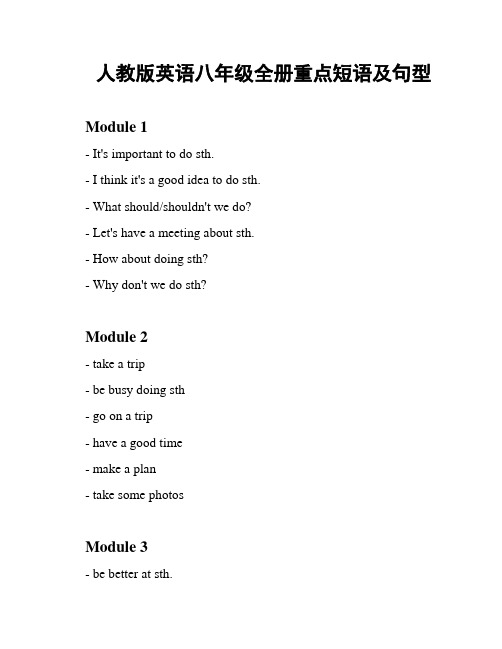
人教版英语八年级全册重点短语及句型Module 1- It's important to do sth.- I think it's a good idea to do sth.- What should/shouldn't we do?- Let's have a meeting about sth.- How about doing sth?- Why don't we do sth?Module 2- take a trip- be busy doing sth- go on a trip- have a good time- make a plan- take some photosModule 3- be better at sth.- more and more + adj.- spend time doing sth.- both A and B- be the same as sth.- neither A nor BModule 4- be short for sth.- write sth. down- What do you mean by sth?- Can you give me an example? - sth. refers to sth.- What's the meaning of sth.?Module 5- be/get used to sth.- be/get accustomed to sth.- be afraid to do sth.- be worried about sth.- prefer/prefer to do sth.- would rather do sth.Module 6- such as sth.- the number of + n. (pl.) + v. (pl.) - a variety of + n. (pl.)- not only A but also B- the same as sth./sb.- be good for sb.Module 7- have a great effect on sth.- play an important role in sth.- take action to do sth.- help sb. do sth.- work together to do sth.- wish sb. sth.Module 8- be full of sth.- such...that...- too...to...- so...that...- have fun doing sth. - It's worth doing sth.。
(完整word版)人教版八年级英语上册重点语法及句型归纳

1、不定代词A.形容词修饰不定代词时,要后知,做后置定语。
I’ll tell you something interesting.B. 不定代词做主语时,谓语动词用第三人称单数。
Everyone is here.2、一般过去时:在一般过去式的句子中,要注意不规则动词过去式的形式与拼写,要牢记一般过去时的时间状语。
I went to the cinema yesterday. / He hurt his foot last night.3、频度副词:在使用频度副词时,要注意频度副词在句子中的位置是:置于be 动词/情态动词/助动词之后,置于实意动词之前,而且对频度副词疑问要用how often。
He always sits in the front of the classroom. / I am never late for school.------How often do you watch TV?-----Every night.4、形容词、副词的比较等级A.Than 是比较级的标志词,than前的形容词或副词要用比较级。
He is taller than me.B.有比较范围(如:in 或of 短语)时,用最高级。
He is the tallest of the three boys.C.形容词最高级前必须加定冠词the.I’m the best student in my class.D.不规则变化的形容词、副词的比较等级要记牢。
He plays the piano worst.5、动词不定式A. 跟动词不定式作宾语的常用动词要记牢。
如:agree (同意);offer (提出);intend,plan (打算,计划);demand,ask (要求);promise (答应);help (帮忙);prepare (准备);decide (决定);refuse (拒绝);dare (敢于);choose (选择);wish,hope,want,expect ,would like (希望,想要);fail ;(不能;忘记);pretend (假装);manage (设法);determine (决心)。
人教版八年级上册英语句型表全
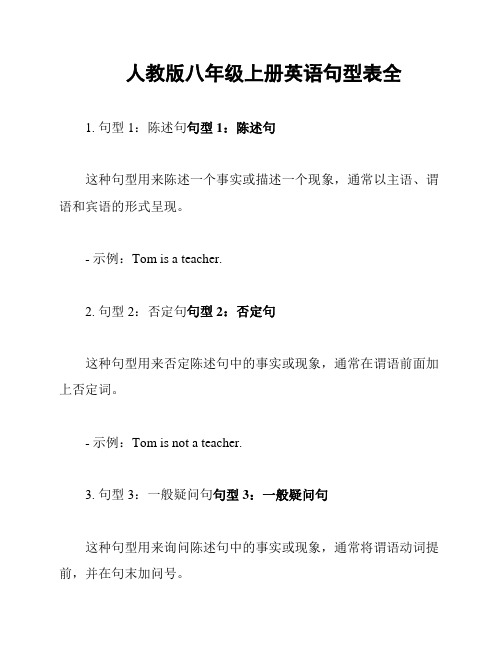
人教版八年级上册英语句型表全1. 句型1:陈述句句型1:陈述句这种句型用来陈述一个事实或描述一个现象,通常以主语、谓语和宾语的形式呈现。
- 示例:Tom is a teacher.2. 句型2:否定句句型2:否定句这种句型用来否定陈述句中的事实或现象,通常在谓语前面加上否定词。
- 示例:Tom is not a teacher.3. 句型3:一般疑问句句型3:一般疑问句这种句型用来询问陈述句中的事实或现象,通常将谓语动词提前,并在句末加问号。
- 示例:Is Tom a teacher?4. 句型4:特殊疑问句句型4:特殊疑问句这种句型用来询问具体的信息,通常以疑问词开头,并在句末加问号。
- 示例:What is Tom's job?5. 句型5:选择疑问句句型5:选择疑问句这种句型用来提供选择并询问对方的意见或选择,通常以“or”连接两个选项。
- 示例:Do you prefer tea or coffee?6. 句型6:祈使句句型6:祈使句这种句型用来表达请求、命令、建议或劝告,通常以动词原形开头。
- 示例:Please clean the room.7. 句型7:感叹句句型7:感叹句这种句型用来表达惊讶、喜悦、赞美等感情,通常以“What”或“How”开头。
- 示例:What a beautiful flower!8. 句型8:条件句句型8:条件句这种句型用来表达假设、条件和结果之间的关系,通常以“If”引导条件从句。
- 示例:If it rains, we will stay indoors.以上是人教版八年级上册英语常用的句型表。
根据具体语境应用这些句型,可以更好地丰富和表达自己的语言技巧。
人教版八年级上册英语知识点汇总
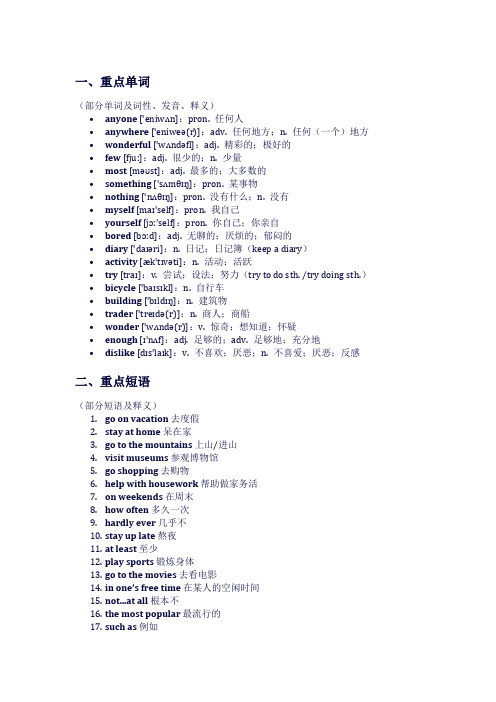
一、重点单词(部分单词及词性、发音、释义)•anyone ['eniwʌn]:pron. 任何人•anywhere ['eniweə(r)]:adv. 任何地方;n. 任何(一个)地方•wonderful ['wʌndəfl]:adj. 精彩的;极好的•few[fjuː]:adj. 很少的;n. 少量•most [məʊst]:adj. 最多的;大多数的•something ['sʌmθɪŋ]:pron. 某事物•nothing ['nʌθɪŋ]:pron. 没有什么;n. 没有•myself [maɪ'self]:pron. 我自己•yourself [jɔː'self]:pron. 你自己;你亲自•bored [bɔːd]:adj. 无聊的;厌烦的;郁闷的•diary ['daɪəri]:n. 日记;日记簿(keep a diary)•activity [æk'tɪvəti]:n. 活动;活跃•try [traɪ]:v. 尝试;设法;努力(try to do sth. /try doing sth.)•bicycle ['baɪsɪkl]:n. 自行车•building ['bɪldɪŋ]:n. 建筑物•trader ['treɪdə(r)]:n. 商人;商船•wonder ['wʌndə(r)]:v. 惊奇;想知道;怀疑•enough [ɪ'nʌf]:adj. 足够的;adv. 足够地;充分地•dislike [dɪs'laɪk]:v. 不喜欢;厌恶;n. 不喜爱;厌恶;反感二、重点短语(部分短语及释义)1.go on vacation去度假2.stay at home呆在家3.go to the mountains上山/进山4.visit museums参观博物馆5.go shopping去购物6.help with housework帮助做家务活7.on weekends在周末8.how often多久一次9.hardly ever几乎不10.stay up late熬夜11.at least至少12.play sports锻炼身体13.go to the movies去看电影14.in one’s free time在某人的空闲时间15.not...at all根本不16.the most popular最流行的17.such as例如18.play tennis打网球19.swing dance摇摆舞20.have a good time玩得愉快三、重点句型(部分句型及示例)1.Where did you go on vacation?o I went to New York City.2.Did you go out with anyone?o No, No one was here. Everyone was on vacation.3.Did you buy anything special?o Yes, I bought something for my father.4.How often do you exercise?o I go to the movies maybe once a month.5.Although many students like to watch sports, game shows are the mostpopular.o虽然很多学生喜欢看体育节目,但游戏节目依然是最受欢迎的。
初二英语知识点总结归纳上册人教版
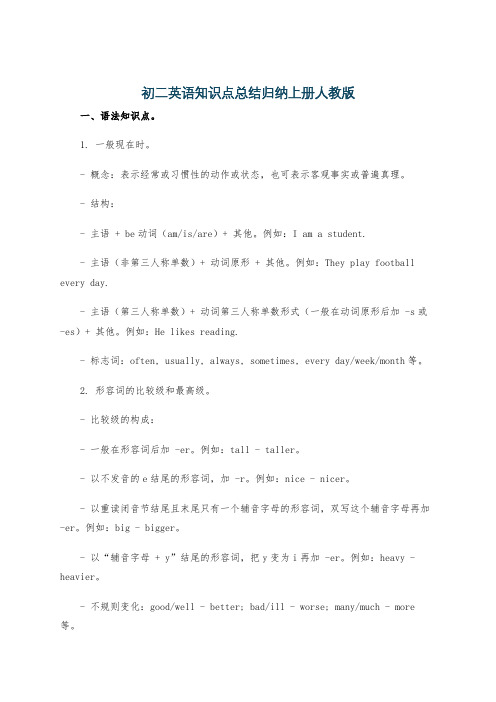
初二英语知识点总结归纳上册人教版一、语法知识点。
1. 一般现在时。
- 概念:表示经常或习惯性的动作或状态,也可表示客观事实或普遍真理。
- 结构:- 主语 + be动词(am/is/are)+ 其他。
例如:I am a student.- 主语(非第三人称单数)+ 动词原形 + 其他。
例如:They play football every day.- 主语(第三人称单数)+ 动词第三人称单数形式(一般在动词原形后加 -s或-es)+ 其他。
例如:He likes reading.- 标志词:often, usually, always, sometimes, every day/week/month等。
2. 形容词的比较级和最高级。
- 比较级的构成:- 一般在形容词后加 -er。
例如:tall - taller。
- 以不发音的e结尾的形容词,加 -r。
例如:nice - nicer。
- 以重读闭音节结尾且末尾只有一个辅音字母的形容词,双写这个辅音字母再加-er。
例如:big - bigger。
- 以“辅音字母 + y”结尾的形容词,把y变为i再加 -er。
例如:heavy - heavier。
- 不规则变化:good/well - better; bad/ill - worse; many/much - more 等。
- 比较级的用法:- 表示两者之间的比较,常用结构“比较级+than”。
例如:He is taller than me.- 最高级的构成:- 一般在形容词后加 -est。
例如:tall - tallest。
- 以不发音的e结尾的形容词,加 -st。
例如:nice - nicest。
- 以重读闭音节结尾且末尾只有一个辅音字母的形容词,双写这个辅音字母再加-est。
例如:big - biggest。
- 以“辅音字母 + y”结尾的形容词,把y变为i再加 -est。
例如:heavy - heaviest。
人教版八年级上册英语句子归纳
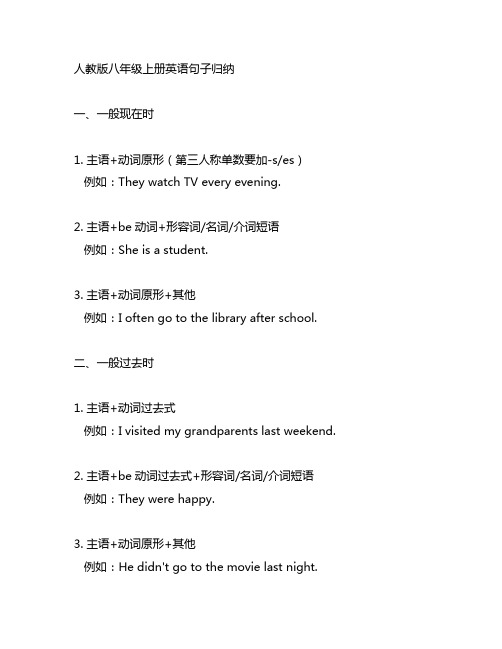
人教版八年级上册英语句子归纳一、一般现在时1. 主语+动词原形(第三人称单数要加-s/es)例如:They watch TV every evening.2. 主语+be动词+形容词/名词/介词短语例如:She is a student.3. 主语+动词原形+其他例如:I often go to the library after school.二、一般过去时1. 主语+动词过去式例如:I visited my grandparents last weekend.2. 主语+be动词过去式+形容词/名词/介词短语例如:They were happy.3. 主语+动词原形+其他例如:He didn't go to the movie last night.三、一般将来时1. 主语+will+动词原形例如:We will have a pic next Saturday.2. 主语+be going to+动词原形例如:She is going to visit her uncle tomorrow.3. 主语+动词原形+其他例如:They are going to watch a movie this weekend.四、现在进行时1. 主语+be动词+动词现在分词例如:I am doing my homework now.2. 主语+be not+动词现在分词例如:She is not playing basketball at the moment.3. 疑问句:Be动词+主语+动词现在分词+其他?例如:Are they watching TV now?五、过去进行时1. 主语+was/were+动词现在分词例如:I was studying when my friend called me.2. 主语+was/were not+动词现在分词例如:He was not sleeping at midnight.3. 疑问句:Was/Were+主语+动词现在分词+其他?例如:Were they w本人ting for the bus at 8 o'clock?六、一般过去时与过去进行时的区别一般过去时:表示过去某个时间发生的动作或存在的状态。
人教版八年级上册英语重点短语及句型
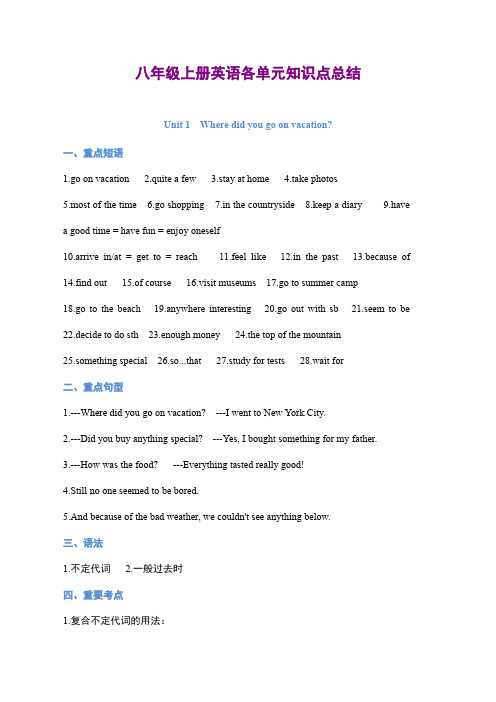
八年级上册英语各单元知识点总结Unit1Where did you go on vacation?一、重点短语1.go on vacation2.quite a few3.stay at home4.take photos5.most of the time6.go shopping7.in the countryside8.keep a diary9.havea good time=have fun=enjoy oneself10.arrive in/at=get to=reach11.feel like12.in the past13.because of 14.find out15.of course16.visit museums17.go to summer camp18.go to the beach19.anywhere interesting20.go out with sb21.seem to be 22.decide to do sth23.enough money24.the top of the mountain25.something special26.so...that27.study for tests28.wait for二、重点句型1.---Where did you go on vacation?---I went to New York City.2.---Did you buy anything special?---Yes,I bought something for my father.3.---How was the food?---Everything tasted really good!4.Still no one seemed to be bored.5.And because of the bad weather,we couldn't see anything below.三、语法1.不定代词2.一般过去时四、重要考点1.复合不定代词的用法:(1)something,anything,nothing,everything是指物的不定代词。
八年级上册英语人教版笔记
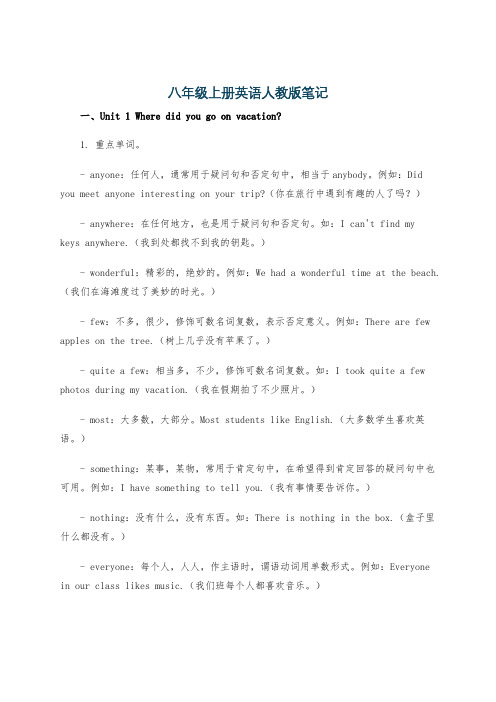
八年级上册英语人教版笔记一、Unit 1 Where did you go on vacation?1. 重点单词。
- anyone:任何人,通常用于疑问句和否定句中,相当于anybody。
例如:Did you meet anyone interesting on your trip?(你在旅行中遇到有趣的人了吗?)- anywhere:在任何地方,也是用于疑问句和否定句。
如:I can't find my keys anywhere.(我到处都找不到我的钥匙。
)- wonderful:精彩的,绝妙的。
例如:We had a wonderful time at the beach.(我们在海滩度过了美妙的时光。
)- few:不多,很少,修饰可数名词复数,表示否定意义。
例如:There are few apples on the tree.(树上几乎没有苹果了。
)- quite a few:相当多,不少,修饰可数名词复数。
如:I took quite a few photos during my vacation.(我在假期拍了不少照片。
)- most:大多数,大部分。
Most students like English.(大多数学生喜欢英语。
)- something:某事,某物,常用于肯定句中,在希望得到肯定回答的疑问句中也可用。
例如:I have something to tell you.(我有事情要告诉你。
)- nothing:没有什么,没有东西。
如:There is nothing in the box.(盒子里什么都没有。
)- everyone:每个人,人人,作主语时,谓语动词用单数形式。
例如:Everyone in our class likes music.(我们班每个人都喜欢音乐。
)- myself:我自己,是反身代词。
I can look after myself.(我能照顾自己。
完整版)人教版英语八年级上册重点短语归纳

完整版)人教版英语八年级上册重点短语归纳Unit 1: Where did you go on n?1."Go on n" means to take a trip or go on holiday.2."Stay at home" means to XXX.3."Go to the mountains" XXX.4."Go to the beach" means to XXX.5."Visit museums" XXX.6."Go to summer camp" means to attend a camp during the summer months.7."Quite a few" XXX.8."Study for" means to learn in XXX.9."Go out" means to leave one'XXX.10."Most of the time" refers to the majority of a d of time.11."Taste good" means that the food or XXX.12."Have a good time" means to enjoy oneself during an activity or trip.13."Of course" is used to XXX.14."Feel like" means to have a XXX desire.15."Go shopping" means to XXX.16."In the past" refers to a time d that has already occurred.17."Walk around" XXX.18."Because of" means as a result of or due to.19."One bowl of" XXX.20."The next day" refers to the day XXX following the current day.21."Drink tea" XXX.22."Find out" means to discover or learn n.23."Go on" means to continue or proceed.24."Take photos" means to capture images with a camera.25."XXX.26."Up and down" means to move XXX.27."Come up" XXX.28."Buy sth。
人教版八年级上册英语各单元重点短语句型【最新整理】
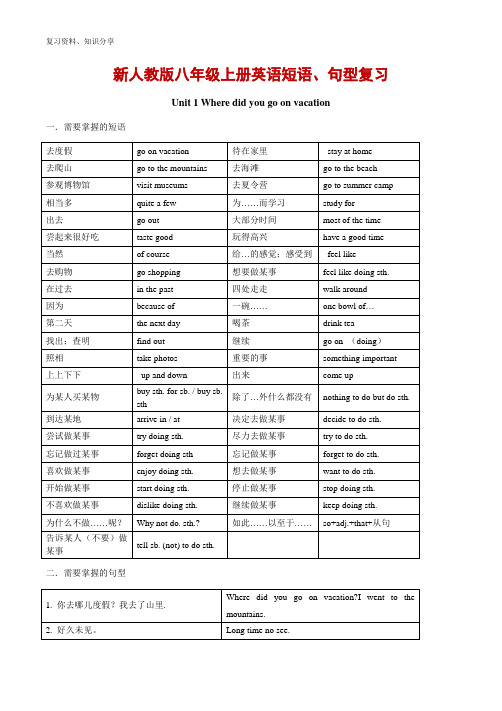
新人教版八年级上册英语短语、句型复习
Unit 1 Where did you go on vacation
一.需要掌握的短语
二.需要掌握的句型
Unit 2 How often do you exercise? 一.需要掌握的短语
.
二.需要掌握的句型
Unit 3 I’m more outgoing than my sister. 一.需要掌握的短语
二.需要掌握的句型
Unit 4 What’s the best movie theater?
一.需要掌握的短语
二.需要掌握的句型
Unit 5 Do you want to watch a game show? 一.需要掌握的短语
二.需要掌握的句型
Unit 6 I’m going to study computer science. 一.需要掌握的短语
二.需要掌握的句型
Unit 7 Will people have robots? 一.需要掌握的短语
二.需要掌握的句型
Unit 8 Will people have robots? 一.需要掌握的短语
二.需要掌握的句型
Unit 9 Can you come to my party? 一.需要掌握的短语
二.需要掌握的句型。
人教版八年级英语上册短语句型归纳

人教版八年级英语上册短语句型归纳- 1. 动词短语- be good at (擅长)- be interested in (对...感兴趣)- be famous for (因...而有名)- be tired of (对...厌烦)- be afraid of (害怕)- be proud of (为...感到骄傲)- be sure about (对...确信)- give up (放弃)- take part in (参加)- get along with (与...相处)- 2. 名词短语- a number of (许多)- a kind of (一种)- a lot of (许多)- a pair of (一双)- a piece of (一片/一块)- a set of (一套)- a group of (一群/一组)- a few (几个)- a little (一点)- a bit of (一些)- 3. 句型归纳- What's your hobby? (你的爱好是什么?)- How often do you...? (你多久...一次?)- Why do you like...? (你为什么喜欢...?)- Would you like...? (你想要...吗?)- Can I help you? (我能帮你吗?)- What do you think of...? (你对...有什么看法?)- What's your favorite subject? (你最喜欢的科目是什么?)- How do you find...? (你觉得...怎么样?)- I can't stand... (我受不了...)- It's up to you. (由你决定。
)以上是人教版八年级英语上册常用的短语和句型归纳,希望对你的学习有所帮助。
- 1、下载文档前请自行甄别文档内容的完整性,平台不提供额外的编辑、内容补充、找答案等附加服务。
- 2、"仅部分预览"的文档,不可在线预览部分如存在完整性等问题,可反馈申请退款(可完整预览的文档不适用该条件!)。
- 3、如文档侵犯您的权益,请联系客服反馈,我们会尽快为您处理(人工客服工作时间:9:00-18:30)。
人教版课本初二上册重点句型大汇总Unit 1 Where did you go on vacation?1.——Where did you go on vacation?你到哪里去度假了?——I went to New York City.我去了纽约城。
2.——Did you go out with anyone?你出去带人吗?——No, No one was here. Everyone was on vacation.不,没有人在这儿。
大家度去度假了。
3.——Did you buy anything special?你买了什么特别的东西吗?——Yes, I bought something for my father.对,我给父亲买了一些东西。
4.——How was the food?食物怎么样?——Everything tasted really good.每一样东西真的都好吃。
5.——Did everyone have a good time?大家玩的开心吗?——Oh, yes. Everything was excellent.对,一切都很精彩。
6.There was nothing much to do in the evening but read.晚上除了读书以外无事可做。
Unit 2 How often do you exercise?1.I go to the movies maybe once a month.我可能一个月看一次电影。
2.——How often does he watch TV?他多久看电视一次?——He hardly ever watches TV.他几乎不看电视。
3.——Do you go shopping? 你购物吗?——No, I never go shopping.不,我从来就不购物。
4.Here are the results.下面就是结果。
5.We found that only fifteen percent of our students exercise every day.我们发现仅仅百分之十五的学生每天锻炼。
6.We all know that many students often go online, we were surprised that ninety percent of them use the Internet every day.我们都知道很多学生经常上网,我们很吃惊他们中有百分之九十的人每天上网。
7.Although many students like to watch sports, game shows are the most popular.虽然很多学生喜欢看体育节目,但游戏节目依然是最受欢迎的。
8.It is good to relax by using the Internet or watching game shows, but we think the best way to relax is through exercise.通过上网或看游戏节目来放松很好,但是我们认为最好的放松方法还是通过锻炼。
9.It’s healthy for the mind and the body.对思想和身体都很健康。
10.So start exercising before it’s too late!开始锻炼,为时不晚。
Unit 3 I’m more outgoing than my sister.1.Sam has longer hair than Tom. = Sam’s hair is longer than Tom’s.Sam 的头发比Tom的长。
2.I’m taller now than I was 2 years ago = I was shorter 2 years ago than I am now.现在的我比两年前更高。
3.I study harder now than I did 2 years ago.现在的我比两年前学习更努力了。
4.I studied harder 2 years ago than I do now.两年前的我比现在学习更努力。
5.Who is smarter, your mother or your father?谁更聪明,你的老爸还是老妈?6.My mother told me a good friend is like a mirror.妈妈告诉我好朋友像一面镜子。
7.That’s why I like reading books.那就是我为什么喜欢读书。
8. I think friends are like books ——you don’t need a lot of them as long as they’re good.我认为朋友像书,只要是好的就不必需要太多。
9.I’m shy so it’s not easy for me to make friends.我很害羞,所以交朋友对于我来说不容易。
10.It’s not necessary to be the same.没有必要一样。
11.I don’t really care if my friends are the same as me or different. 我不太关心朋友是否与我一样。
12. A true friend reaches for your hand and touches your heart.真朋友在你需要是帮助你,打动你。
13.In fact, she’s funnier than anyone.事实上,她比任何人都更幽默。
14.In what ways are you different?你们在哪些方面不同?15.Is he different from you in any way?在某方面他与你不同吗?16.She’s always there to listen.她总是准备着倾听。
17.Huang Lei isn’t as good at tennis as Larry.Huang Lei打网球不如Larry。
Unit 4 What’s the best movie theater?1.The DJs choose songs the most carefully.流行音乐节目主持人最认真的选择歌曲。
2.How do you like it so far? = What do you think of it so far? = How do you feel about it so far?到目前为止,你认为它怎么样?3.Thanks for telling me.多谢你告诉我。
4.Be up to you to do something由你决定做……5.They play a role in deciding the winner.他们在决定胜利者方面起着重要作用。
6.He is much better than other actors at finding the most interesting roles.他在发现最有趣的角色方面比其他演员要擅长得多。
7. I still don’t really know my way around.我依然不认得周边的路。
8.How far is it from your home?从你家去有多远?9.However, not everybody enjoys watching these shows.然而,不是每个人都欣赏这些表演。
10.Some think that the lives of the performers are made up.有的人认为那些表演都的生活经历是编造的。
11.However, if you don’t take these shows too seriously, they are fun to watch.然而,假如你不把这些表演看得太当真,它们还是值得看的。
12.And one great thing about them is that they give people a way to make their dreams come true.有关它们的一件了不起的事情是,它们给人们指明了一条让他们的梦想成真的道路。
Unite 5 Do you want to a game show?1.Some people might ask how this cartoon animal became so popular.有些人可能会问这个卡通动物怎样变得如此受欢迎了呢。
2.Mickey was like a common man, but he always tried to face any danger. Mickey.象一个普通人,但是他总是努力面对任何危险。
3.Mickey was unlucky and had many problems such as losing his house or girlfriend.Mikey是不幸的,总是面对很多问题,如失去房子或女朋友等。
4.However, he was always ready to try his best.然而,他总是准备尽最大努力。
5.Most of them wanted to be like Mickey.他们大多数都想象Mickey一样。
6.On November 18, 1978, Mickey became the first cartoon character to have a star on the Hollywood Walk of Fame.1978年11月18日,Mickey 成为在好莱坞星光大道上拥有一颗星星的第一个卡通形象。
7.Today’s cartoons are usually not so simple as little Mickey Mouse, but everyone still knows and loves him.今天的卡通通常都不如Mickey Mouse那样简单,但是人人都知道他,热爱他。
8.Who has a pair of ears more famous than Mickey’s?谁有一双比Mickey的耳朵更闻名于世的呢?9.I think those movies are so meaningless.我认为那些电影如此地毫无意义。
10.I’d like to find out what different people think of a subject.我喜欢发现不同的人对同一主题的看法。
